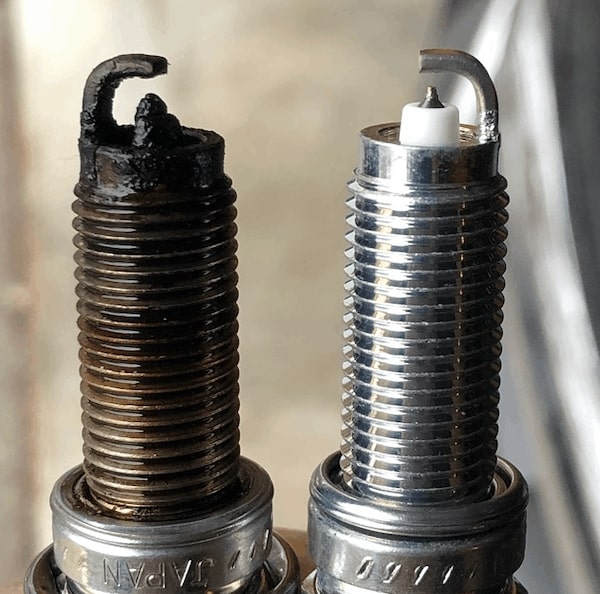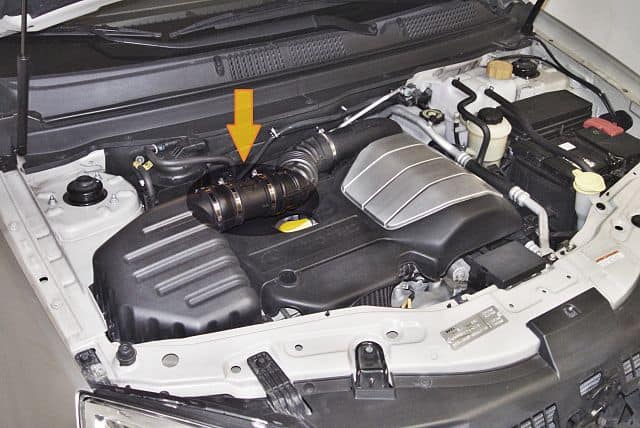A sputtering engine can indicate a number of problems. If your Toyota Sequoia has a sputter, it is most likely going to be caused by bad fuel system, ignition system, MAF sensor, or bad catalytic converter.
Your Sequoia’s engine is a giant pump. It pulls in air (where it is measured by the mass airflow sensor). The air is then guided into the cylinder where fuel is added and compressed. Once compressed, the mixture it is ignited by the spark plugs. It is then expelled through the exhaust, where it is then scrubbed by the catalytic converter before being sent through the exhaust pipe.
Before diving into our list of the most common reasons that a Sequoia’s engine sputters, make sure to check for trouble codes if you have a check engine light on. This can radically reduce the time it takes you to diagnose the problem.
Any failure in the process listed above can lead to a sputtering engine. Here are the most likely causes of sputtering:
1. Bad Ignition System
Your ignition system is more than just the spark plugs. It relies on data from the crank and cam sensors to time the spark properly. The coil or coil packs need to be strong. The spark plugs themselves can go bad over time. Although with a modern vehicle, it should be able to go near – 100,000 miles without the plugs showing much damage.
Diagnosis + Repair
If you do have a problem with the ignition system, you’ll more than likely get a diagnostic trouble code that indicates that there is a problem with the ignition system, such as P0300 (Random Multiple Misfire) or P030X where X represents the exact cylinder that is misfiring.
If there is reason to believe that the ignition system has gone bad, take a look at the spark plugs first. They can tell you a lot about what is going on with the engine. Here’s a more in depth guide on bad spark plugs.

If the plugs look fine, check the spark plug wires (if so equipped), make sure that they look good (not dry rotted, not melted). An old trick that you can do to check them is to make sure that they are not bleeding spark. Wait until it is dark, turn off the headlights and check under the hood. If you see spark coming from the wires, replace them and hopefully that will solve the problem.
If the plug wires check out, you’ll need to test the coil packs themselves. You can do it with a voltmeter. Here’s a great video to help you with that.
Fuel System Issues
The next item on the list would be the fuel system. The fuel system starts with the Sequoia’s fuel pump, which will be in the gas tank. It sends fuel through the fuel lines and filter to your its fuel injectors.
There needs to be enough fuel pressure for the fuel to properly atomize at the injectors. If there is not the engine will sputter like crazy, as it will be starved for fuel.
Diagnosis + Repair
Most vehicles have a port to manually check the fuel pressure. That’s a great place to start. You’ll have to look up where it is for your particular model year and engine combo. But, they usually aren’t hard to access.
If the fuel pressure reading is below where it needs to be, checking and replacing the fuel filter would be the first thing to check. It’s easier to get to than the fuel pump. Otherwise, you’ll more than likely have to drop the tank and replace the fuel pump.
Before going through all of that though, make sure to inspect the fuel lines for any crimping or damage.
If the pressure looks good, you’ll need to determine if the injectors are clogged or leaking. Smell for gas right after running the engine. That’s a strong indication that a fuel injector is leaking. If it is leaking, consider it a fire hazard and don’t run the engine again until the injector has been replaced.
Further Reading:
Toyota Sequoia Fuel Filter Diagnosis
Toyota Sequoia Fuel Pump Diagnosis
Bad Catalytic Converter
A bad catalytic converter will cause your Sequoia’s engine to sputter. It scrubs the exhaust to remove pollutants. When a converter goes your vehicle is effectively choked. The two most obvious signs that one has gone bad will be engine sputtering and a rotten egg smell.
Diagnosis + Repair
If the catalytic converter has gone bad, it will show itself the most when you need power. When the engine is idling, it may not sputter at all. As it revs up, more exhaust is created at one time. This leads to a back pressure increase, which chokes the engine from the exhaust side.
You’ll need to replace the catalytic converter if it is clogged. The most common OBD II codes associated with this code are P0420 or P0430.
Keep your nose open you should smell a bad smell coming from a bad catalytic converter.
MAF Sensor

The mass airflow, or MAF, sensor checks the air volume and temperature as it enters the engine. It’s one of the most important sensor that your Sequoia has. Just like the air filter that protects it, it can get dirty. When it gets dirty it can’t read the air entering the engine properly and your engine will sputter.
Diagnosis + Repair
The mass airflow sensor is really easy to get to. It’ll be between the intake manifold and the air filter. If you do have to clean it, make sure that you are using mass airflow sensor cleaner, and nothing else. Otherwise you can damage it. Here’s a great video on how to properly clean a MAF sensor.
Further Reading:
Toyota Sequoia MAF Sensor Diagnosis
Conclusion: Sequoia Engine Sputtering
Engine sputtering is a tough problem to track down. The above list is not everything that can cause this problem, but it is a great start. If you find out what happened to cause your car to sputter, please come back and leave a comment. Good luck!

